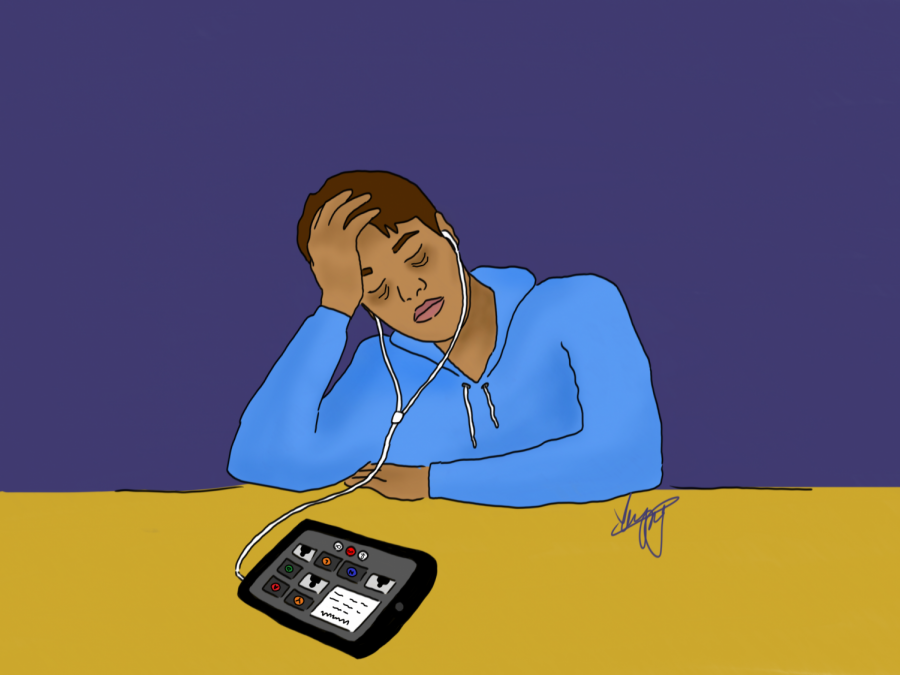How are teenagers’ sleep schedules affected by the hybrid model?
March 19, 2021
An adequate amount of sleep each night can be difficult for a high school student to get. With sports, extracurriculars and other responsibilities, teenagers often find themselves staying up into the early morning to finish homework. The hybrid model that began at MHS almost two months ago has not been encouraging earlier bedtimes either.
For Natalie Ashline,’24, her sleep schedule is not something she worries very much about. On weekdays, she will go to bed anywhere between 11:30 PM and 1 AM, and between 12 to 4 AM on weekends. She wakes up at 6:30 for in-person classes and at 7:30 when she is online. This would give her between eight to five hours of sleep on an average school day, though Ashline herself admits she usually gets six or less.
When asked if she thinks she gets enough sleep, Ashline quickly said no.
She then went on to say, in response to a question about how tired she usually feels, “Depends on the time of the day. If I’m at school, then the first three hours I feel like I’m going to fall asleep. In general I feel tired a lot.” She also said “[she doesn’t] have a structured sleep pattern because [she’s] waking up and going to bed at different times every day.”
She also talked about the impact of school on her sleep.
“Some days I stay up doing homework because I procrastinate, Ashline said.
Now that the high school is back on its typical six-period schedule, she has a lot more work to do each night, which leads to later bedtimes.
In regards to the hybrid model specifically, Ashline said that she stays up especially late on Tuesdays because she can sleep in on the following MAST day. She also said it bothers her that the model is generally inconsistent, requiring students to wake up early on in-person days, slightly later on online days, and having no school at all on Wednesdays.
Ashline thought of some changes that could be made to the model to better benefit MHS students with their sleep schedules, which included starting school later and going back to a three-period schedule rather than the six-period one.
Finally, she gave a number from one to ten for how important she thinks sleep is for bodily versus mental health.
“I would say a seven or eight,” she said about her bodily health. “It definitely affects the body more. I feel tired constantly and my head hurts more. It’s harder to concentrate.”
She gave a seven out of ten for the importance sleep has in relation to mental health, mentioning how she is more likely to feel better about herself, worry less and focus on the things she loves when she’s gotten more sleep.
An article on sleep and health from Centers for Disease Control and Prevention (CDC) said that, “Adequate sleep contributes to a student’s overall health and well-being. Students should get the proper amount of sleep at night to help stay focused, improve concentration and improve academic performance.”
It goes on to address the various health risks children and adolescents are more vulnerable to if they do not get enough sleep. These include type 2 diabetes, obesity, poor mental health and physical injuries. Additionally, children and adolescents that get less sleep have a higher likelihood to have attention and behavioral problems; this could contribute to poor academic performance. The American Academy of Sleep recommends adolescents ages thirteen to eighteen get 8 to 10 hours of sleep per 24 hours. However, studies show that 7 out of 10 high schoolers do not get that much.
- It is often difficult for high school students to get a lot of sleep each night, as they are in a period of their lives when they are arguably their busiest and most stressed. The hybrid model also seems to have affected this. But with the new, fully in-person model that recently began on March 15, MHS students will be able to return to a more normal schedule and hopefully get a little more sleep.






























